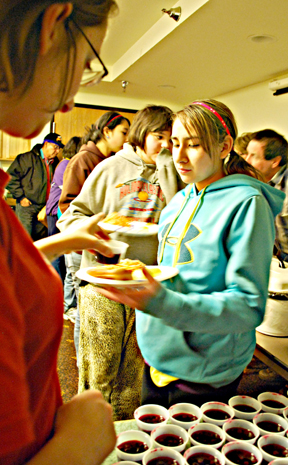
Jenny Seminole Parker

Ft. Robinson Outbreak Spiritual Run participants receive fry bread and wojapi at spaghetti feed in Belle Fourche during their 400-mile annual reenactment of the winter escape of prisoner-of-war ancestors.
Last living child of Ft. Robinson breakout survivor speaks
By Talli Nauman
Native Sun News
Health & Environment Editor BELLE FOURCHE — The annual Ft. Robinson Outbreak Spiritual Run, held Jan. 8-14, 2013 this year, reenacts the escape and 400-mile winter trek to today’s Northern Cheyenne Indian Reservation in Montana that a band of Sioux prisoners of war survived after about 150 men, women and children were held hostage by U.S. troops at the fort in Nebraska in 1879. For the past several years, Jenny Seminole Parker, the last living child of a Ft. Robinson prison survivor, has joined the observation to share her family’s story with participants gathered by Lame Deer, Montana non-profit Yellow Bird Inc., founded by Philip Whiteman and Lynette Two Bulls. Parker also shared the oral history with Native Sun News on Jan. 12, when this year’s approximately 150 relay runners in the event arrived in Belle Fourche: My father’s Cheyenne name was Big White Man. His white name was Miles Seminole. He said, “You should be grateful. You don’t have anything to worry about. Compared to our day, life is easy for you.” He said when we were coming on the Long Walk in Indian territory, we went to the fort to get food and get warm and to help some of the warriors that were wounded and the people that were sick and tired. The leaders refused to go back, so they locked us up for I don’t know how many days, and they wouldn’t give us any food or water, he said -- maybe 10 days. The little children were hungry and crying, and there were a lot of sick, old people. So some of the ladies had extra buckskin and extra rawhide, and they would cut it in little pieces and give it to the children and tell them, “Chew on this; it’ll make saliva.” And in the morning when the windows would be frosted so hard with ice, they would have the little kids line up, and they would lick the frost from the window for water. That’s how we all got water, he said. Some of the elders said, “Let the young people get water first,” he said. That’s how strong people were. They went without water and food, he said. It was the prayer that gave them the strength to survive. When they decided to break out of there, he said, they had a meeting of everyone and the leaders explained to them, “We’re going to break out of here and everyone has to run – run for their lives.” And so there were some of the warriors that were wounded who said, “Well, we’ll break out first and we’ll sit down out front and distract the soldiers. And my father’s uncle, my grandma’s brother, had been shot in the leg and with several young men that were wounded broke out first and sat down. My father said when they broke out and got ready to run, he looked back, he said, I saw a soldier run up to my uncle and shoot him in the head. He took off runnin’, he said, and my other uncle, he said, got shot, so his wife ran back, and she hollered at my grandma, “Take my children.” She had two children. She had a baby and she had one about maybe six, seven years old. My grandma told my father to take the little boy’s hand and run with him. She said, “If one of you gets shot, one of you keep runnin’. Don’t stop. Don’t stop no matter what. Just keep runnin’.” And so she put the baby on her back with her blanket and they ran. He said it seemed like we ran a long ways. My heart was pounding so loud it sounded like a drum, he said. I could just hear it, he said. I would cover my mouth so the soldiers wouldn’t hear it, he said. When we sat down by some trees to rest, my mom took her blanket down to hold the baby and here when she turned it over, the baby was dead. So my grandma wrapped the baby up and she said, “We’ll have to leave it here,” and we put it next to the tree there, he said, and he said, we lost both kids. And she said, “From here on, you run – you run for your life. If I get shot, don’t come back. Don’t look back. Just run. Don’t ever look back. Go forward. Just keep going.” He said, here when we got up to the Pine Ridge hills, we met other Cheyenne, so we all got together and we all started walking. And they walked I don’t know how many miles, probably over a hundred miles, and he said there was a Frenchman that had a trading post in Nebraska, and they stopped there to ask for food. They had a little dugout in the ground and it’s still there today. That man told them, “There’s buffalo robes in there. Cover yourselves up. I’m going to feed you.” He was married to a Cheyenne woman. So the woman prepared the food and the man went and fed them. After they were fed and warmed up, why then they started walking again and they walked all the way down to Cheyenne Creek. It’s by Oglala. They stayed there through the winter, and in the spring they all went back north. I cry every time I think about how they were hunted like animals and shot. (Contact Talli Nauman, NSN Health and Environment Editor at talli.nauman@gmail.com)
Join the Conversation